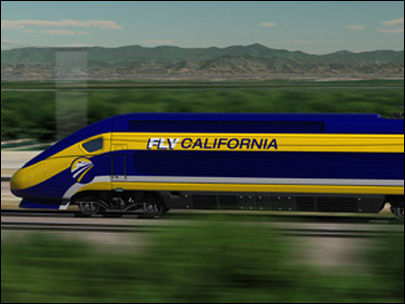President Obama's proposed high speed rail initiative would have the US embarking on the biggest infrastructure project since the interstate highway system. And while the significance of this effort -- and the need for more sustainable transportation options -- may be lost on a few cranky governors, it is not going unnoticed by the private sector. Indeed, while governors in Florida, Wisconsin, and Ohio have made hay about high-speed rail being a "boondoggle" that will cost their states millions, private investors at home and abroad are lining up to cash in.
High-speed rail projects from California to Florida have attracted the interest of investors from the Bank of Japan to Goldman Sachs, according to multiple sources.

"There really isn’t a day in our office that we're not approached by a supplier or a provider," said Rachel Wall of the California High Speed Rail Association.
Private investment in rail was the topic of a House Committee on Transportation and Infrastructure hearing this morning, where Congressional representatives looked at ways to better catalyze private involvement to bring rail projects forward.
"Don’t tell me you cannot make money moving passengers by rail," said Rep. John Mica, who chairs the committee. "We will drag Congress and whoever else kicking and screaming into the 21st century with passenger rail service with private sector participation, one way or another."
Mica promised the transportation reauthorization bill would contain "robust provisions" to allow for private competition and investment opportunities.
Mica said Europe and Asia abound with stories of successful public private partnerships that make passenger rail service affordable and efficient, and they could bring that efficiency to the U.S.
"I met recently with one of the leading Japanese entrepreneurs in passenger rail service. They're willing to put up huge amount of investment," Mica said. "They’re there to gain a return on their investment. That's a great motivator."
Andy Kunz, of the US High Speed Rail Association, said that when his organization launched two years ago, they met with 80 countries and they all said they had money to invest.
"It’s such a huge project," he said. "The physical size of the United States, the wealth levels, the fact that Americans travel probably two or three times more [than many European and Asian nations]; this is a huge market for high-speed rail."
"There’s serious money to be made here," he added.
Wall said California is hoping to attract about $10 billion in private investment on the $42 billion project. Project coordinators there have just begun accepting formal expressions of interest from private investors, she said, and California will be holding an industry forum in April to answer questions and present information for prospective investors.
"This gives them an opportunity to put in writing what they have been telling us for years," she said.
She expects that investment to come in late in the project. State and federal investment is a precursor to private investment she said.
Kunz concurred that private and foreign investment would probably be later-stage and more focused on technology and operating expenses than on infrastructure. The way laws are currently drafted, however, does not easily facilitate private public partnerships, he said. USHSR is working on draft legislation that will help the country take advantage of private investment, and he said they have bi-partisan support.
So where does all this talk of private investment leave Amtrak? The company is supportive of efforts to augment the current rail network, said Amtrak vice president Stephen Gardner at the hearing, but he warned, "The private sector is not a silver bullet that ensures success." He said Amtrak understands it does not have exclusive right to operate inter-city passenger trains. But he warned that private freight railroads, which have given access rights to Amtrak, might oppose access for other companies.
"We’re not afraid to compete in this market, but on a level playing field," he added. "Other companies must be subject to the same laws and rules as Amtrak,"
Edward Wytkind, president of the Transportation Trades Department at the AFL-CIO, echoed that sentiment. He said that if entities other than Amtrak get into the game, the wage laws and employee protections guaranteed to Amtrak workers must be applied to all workers in the industry. Otherwise, he said, the playing field won't be level.
Wytkind said the union is supportive of private sector investments so long as it does not break up Amtrak, which has suffered from inadequate investment. "Too often in Washington, time is wasted creating new programs rather than perfecting the ones we already have," Wytkind said.
He also cautioned that continued government support is imperative.
"No rail system around the world operates free of subsidy," Wytkind said. "It’s a fiction." He questioned the invocation during the hearing of European examples, like the UK, as models of the success of private investment. He says in the UK, rather than increase efficiency, privatization unleashed a torrent of problems and was ultimately scrapped.





